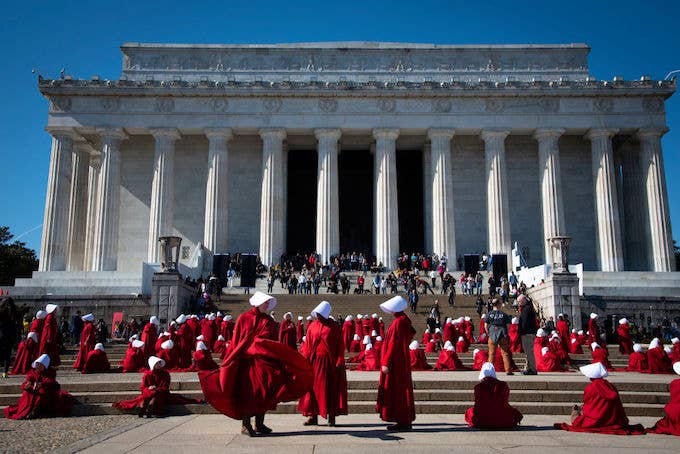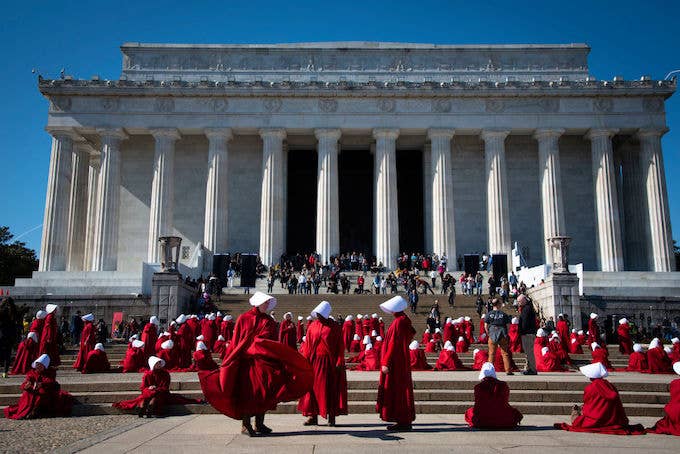
The Handmaid's Tale returned to Hulu on Wednesday, and within the captivating scenes depicting female desperation, references to the political zeitgeist remind viewers why Gilead eerily looks like an exaggerated allegory of the direction we're headed.
*Handmaid's Tale spoilers ahead*
Since its debut in 2017, the award-winning drama has drawn heavy-handed parallels between the dystopia and Trump's America. Based off of Margaret Atwood's book of the same name, the show's premise revolves around women being forced into reproductive slavery, which, as state legislatures in Alabama and Missouri recently demonstrated, doesn't feel all-too-distant.
That's not to say that in the next five years, women will be subjected to the same level of maltreatment. However, in the three episodes Hulu released this week, visual and contextual references, like Emily being wrapped in a foil-like blanket once she reaches the Canadian border, reinforced the prescient comparisons that can be drawn between The Handmaid's Tale and our current political landscape.
During an interview with The Hollywood Reporter, Elizabeth Moss, who plays the series protagonist June, said Season 3 is intended to bring the audience to empathize with the characters in the show. "We're asking the audience to come with us on this ride, but what we're trying to do and what I'm trying to do is show the person that you would become, if you lived in that system for that long and you had seen the things that you had seen and you had done the things that you've done and the things that had been done to you, and how that would change you," she said.
In Episode 3, titled "Useful," June is asked by her new commander, Joseph Lawrence, to fetch him one of the texts on his towering bookshelf—Charles Darwin's The Descent of Man and Selection in Relation to Sex. Darwin wrote the text in 1871, and in it, he proposes scientific discoveries that at the time, 'proved' women's biological inferiority to men. Whereas the series has continuously spotlighted the dangers of religious zealotry, Season 3 is repositioning the dialogue to account for the historical and biological pretext that provided the foundation for gender inequality.
Another scene, when June is attempting to map out the escape route the Martha's have plotted, she walks in a fenced-off line as guardians check each woman's ID. One of the Martha's ahead of her, a black woman, presents the guards with a copy of her identification card, who then aggressively inform her that it is expired and shove her out of line. Although it may not be as clear of a reference as Darwin, the image of a woman of color not being able to gain access to a location that, even in Gilead, she's afforded the ability to, prompts comparison to the voter ID laws seemingly introduced solely to suppress minority voting.
In 2017, Margaret Atwood, who released her book The Handmaid's Tale in 1985, wrote an op-ed in the New York Times titled "Margaret Atwood on What The Handmaid’s Tale Means in the Age of Trump." In the article, she notes the perceived similarities between reality and non-fiction and acknowledges the book is exaggerated, however many are feeling the societal tensions of the present day.
"In the wake of the recent American election, fears and anxieties proliferate," she wrote. "Basic civil liberties are seen as endangered, along with many of the rights for women won over the past decades, and indeed the past centuries. In this divisive climate, in which hate for many groups seems on the rise and scorn for democratic institutions is being expressed by extremists of all stripes, it is a certainty that someone, somewhere — many, I would guess — are writing down what is happening as they themselves are experiencing it. Or they will remember, and record later, if they can."

